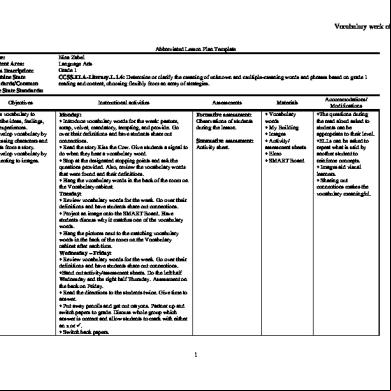Week 4 Vocabulary And Grammar Verb Complementation I Theory 716e6j
This document was ed by and they confirmed that they have the permission to share it. If you are author or own the copyright of this book, please report to us by using this report form. Report 3b7i
Overview 3e4r5l
& View Week 4 Vocabulary And Grammar Verb Complementation I Theory as PDF for free.
More details w3441
- Words: 1,237
- Pages: 3
Week 4 – Verb complementation I
Practical course – Vocabulary and Grammar
A. Verbs followed by that-clauses and adjectives 1) Verbs followed by that-clause many verbs can be followed by a that-clause, especially report verbs and verbs referring to mental processes such as thinking, feeling, realizing decide, comment, say, forecast, request, write, warn, assume, consider, infer, conclude, reckon, recognise, presume the fact that can be used with some of these verbs for additional emphasis I recognise the fact that she can’t help it. some transitive verbs can’t be followed by a that-clause alone but only by the fact that ignore, can’t bear/stand, enjoy, express, investigate, leave out, face We cannot ignore the fact that she lied to us. That-clause or to-infinitive both can be used after some verbs (agree, hope, pretend, forget etc.) with practically no difference in meaning He agreed to come. He agreed that he would come. I promise to . I promise that I’ll . a few verbs can be followed by an object + to-infinitive (usually to be) usually more formal than that-clauses (announce, confirm, discover, pronounce, feel) To-infinitive That-clause I recognise her to be one of our best players. I recognise that she is one of our best players. I know him to be scrupulously honest. I know that he is scrupulously honest. They estimated costs to be in the region of ₤1m. They estimated that costs were in the region of ₤1m. Wh-clauses many verbs commonly followed by that-clause can also be followed by a wh-clause I didn’t know what to do. / I can’t imagine why they did that. sometimes they are in reported questions He asked what I was doing. 2) Verbs followed by describing nouns or adjectives some verbs are followed by nouns or adjectives that describe the subject include verbs connected with appearance and the senses (appear, look, sound, seem etc.) and those connected with change (become, remain, grow, turn etc.) My father remained a member of the society even after they criticised his behaviour. other verbs (prove, appear, seem etc.) are followed by an adjective or to be + adjective The plan proved (to be) unworkable. some verbs (make, constitute, form, comprise etc.) are followed by describing noun phrases You’ll make a rotten teacher – you’ve no patience. / This represents a considerable increase in our profits. some verbs are followed by object + complement most of these verbs are used in a limited range of collocations The jury found him guilty of arson. / He knocked him unconscious in the third round. / You’re driving me crazy! / I hold you responsible for the damage. / I want him caught as soon as possible. a few intransitive verbs can also be followed by adjectives lie empty/awake/helpless etc.; stand motionless/erect/firm/proud/idle etc.; sit quiet/silent/still etc.; die young/happy/intestate etc.; escape unharmed etc.; unnoticed/undetected etc.; emerge unscathed/uninjured etc.
1
Week 4 – Verb complementation I
Practical course – Vocabulary and Grammar
B. Verbs used with prepositional and adverbial phrases 1) Verbs of movement most of them are commonly followed by a prepositional phrase or adverbial phrase drift, pour, speed, slide, stagger, pull in, set off, leap, storm, bound, turn, arrive, float, burst, limp, race, shuffle, skid, hurry, waft The van skidded into the back of the car in front. / The rescue workers hurried towards the scene of the accident. / The smell of something wonderful wafted through from the kitchen. 2) Verbs of position some verbs which indicate the position of things are commonly followed by a prepositional phrase or an adverbial phrase remain, end up. Occur, stay, settle, stick, hang, sit, stare, stretch, extend, face I grabbed my coat which was hanging behind the door. / We all sat at our desks and stared out of the window. / The sandy beach stretches for miles along this part of the coast. / His land extends as far as the eye can see. / She turned his chair so it faced towards the sea. 3) Verb + Object + Prepositional / Adverbial Phrase with some verbs, the prepositional or adverbial phrase commonly follows an abject replace, plunge, pop, screw, position, load, lean, dump, stuff, thrust, toss, lower, transfer, drag, invite, urge, tempt, force, steer I picked up the picture and replaced it on the table. / You need to plunge the tomatoes into boiling water to help remove their skins. / Pop the pies into the oven for five minutes to heat them through. 4) Verb + Adverb some verbs are commonly followed by an adverb describing a particular quality handle, break off, begin, end, sell, progress, dress, react, behave, eat, go, burn, scratch, cut, do The car handles particularly well on corners. / Christoula’s English is coming along nicely. / You’ll find the section you need breaks off easily. a small group of verbs commonly followed by together stick, pull, get, knock around, move in, club, live We must all stick together if we’re going to survive. 5) Verb + way some verbs commonly followed by a possessive pronoun + way + prepositional / adverbial phrase smash, crawl, fight, force, blast, dig, find, make, edge, inch, squeeze, worm, charm, talk, cheat, trick, buy, lie, negotiate Spiderman managed to smash his way into the robber’s hideaway. / The advance guard slowly crawled they way across np-man’s-land.
C. Verb and preposition Prepositions Verbs about advise about argue about be concerned about be worried about boast about decide about against advise against argue against decide against/in favour of
dream about guess about know about laugh about protest about insure against protest against vote against
Prepositions in
Verbs absorbed in confide in be engrossed in implicate in involve sne in sth
of
accuse sne of approve of boast of convict of dream of
2
result in specialise in succeed in trust in
know of remind sne of suspect of taste of
Week 4 – Verb complementation I
Practical course – Vocabulary and Grammar
at
glance at/through guess at hint at
laugh at marvel at
between
choose between distinguish between
for
for ire sne for allow for apologise for argue for blame sne for care for
cater for charge for count for earmark for pay for vote for
from
bar from benefit from derive from deter from differ from distinguish sth from distract from exempt from
expel from refrain from resign from result from stem from suffer from translate from/into
on
to
with
3
advise on base on blame on centre on concentrate on congratulate sne on answer to appeal to apply to attend to attribute to commit to confess to denote sth to sne devote to explain sth to sne acquaint with argue with associate with charge sne with clutter with coincide to collide with comply with concern with confront with confuse with
decide on depend on elaborate on impose on insist on pride on object to prefer sth to sth refer to be resigned to resort to see to subject to succeed to be used to cram with deal with discuss sth with sne face with ingratiate with meet with pack with plead with provide with tamper with trust with
Practical course – Vocabulary and Grammar
A. Verbs followed by that-clauses and adjectives 1) Verbs followed by that-clause many verbs can be followed by a that-clause, especially report verbs and verbs referring to mental processes such as thinking, feeling, realizing decide, comment, say, forecast, request, write, warn, assume, consider, infer, conclude, reckon, recognise, presume the fact that can be used with some of these verbs for additional emphasis I recognise the fact that she can’t help it. some transitive verbs can’t be followed by a that-clause alone but only by the fact that ignore, can’t bear/stand, enjoy, express, investigate, leave out, face We cannot ignore the fact that she lied to us. That-clause or to-infinitive both can be used after some verbs (agree, hope, pretend, forget etc.) with practically no difference in meaning He agreed to come. He agreed that he would come. I promise to . I promise that I’ll . a few verbs can be followed by an object + to-infinitive (usually to be) usually more formal than that-clauses (announce, confirm, discover, pronounce, feel) To-infinitive That-clause I recognise her to be one of our best players. I recognise that she is one of our best players. I know him to be scrupulously honest. I know that he is scrupulously honest. They estimated costs to be in the region of ₤1m. They estimated that costs were in the region of ₤1m. Wh-clauses many verbs commonly followed by that-clause can also be followed by a wh-clause I didn’t know what to do. / I can’t imagine why they did that. sometimes they are in reported questions He asked what I was doing. 2) Verbs followed by describing nouns or adjectives some verbs are followed by nouns or adjectives that describe the subject include verbs connected with appearance and the senses (appear, look, sound, seem etc.) and those connected with change (become, remain, grow, turn etc.) My father remained a member of the society even after they criticised his behaviour. other verbs (prove, appear, seem etc.) are followed by an adjective or to be + adjective The plan proved (to be) unworkable. some verbs (make, constitute, form, comprise etc.) are followed by describing noun phrases You’ll make a rotten teacher – you’ve no patience. / This represents a considerable increase in our profits. some verbs are followed by object + complement most of these verbs are used in a limited range of collocations The jury found him guilty of arson. / He knocked him unconscious in the third round. / You’re driving me crazy! / I hold you responsible for the damage. / I want him caught as soon as possible. a few intransitive verbs can also be followed by adjectives lie empty/awake/helpless etc.; stand motionless/erect/firm/proud/idle etc.; sit quiet/silent/still etc.; die young/happy/intestate etc.; escape unharmed etc.; unnoticed/undetected etc.; emerge unscathed/uninjured etc.
1
Week 4 – Verb complementation I
Practical course – Vocabulary and Grammar
B. Verbs used with prepositional and adverbial phrases 1) Verbs of movement most of them are commonly followed by a prepositional phrase or adverbial phrase drift, pour, speed, slide, stagger, pull in, set off, leap, storm, bound, turn, arrive, float, burst, limp, race, shuffle, skid, hurry, waft The van skidded into the back of the car in front. / The rescue workers hurried towards the scene of the accident. / The smell of something wonderful wafted through from the kitchen. 2) Verbs of position some verbs which indicate the position of things are commonly followed by a prepositional phrase or an adverbial phrase remain, end up. Occur, stay, settle, stick, hang, sit, stare, stretch, extend, face I grabbed my coat which was hanging behind the door. / We all sat at our desks and stared out of the window. / The sandy beach stretches for miles along this part of the coast. / His land extends as far as the eye can see. / She turned his chair so it faced towards the sea. 3) Verb + Object + Prepositional / Adverbial Phrase with some verbs, the prepositional or adverbial phrase commonly follows an abject replace, plunge, pop, screw, position, load, lean, dump, stuff, thrust, toss, lower, transfer, drag, invite, urge, tempt, force, steer I picked up the picture and replaced it on the table. / You need to plunge the tomatoes into boiling water to help remove their skins. / Pop the pies into the oven for five minutes to heat them through. 4) Verb + Adverb some verbs are commonly followed by an adverb describing a particular quality handle, break off, begin, end, sell, progress, dress, react, behave, eat, go, burn, scratch, cut, do The car handles particularly well on corners. / Christoula’s English is coming along nicely. / You’ll find the section you need breaks off easily. a small group of verbs commonly followed by together stick, pull, get, knock around, move in, club, live We must all stick together if we’re going to survive. 5) Verb + way some verbs commonly followed by a possessive pronoun + way + prepositional / adverbial phrase smash, crawl, fight, force, blast, dig, find, make, edge, inch, squeeze, worm, charm, talk, cheat, trick, buy, lie, negotiate Spiderman managed to smash his way into the robber’s hideaway. / The advance guard slowly crawled they way across np-man’s-land.
C. Verb and preposition Prepositions Verbs about advise about argue about be concerned about be worried about boast about decide about against advise against argue against decide against/in favour of
dream about guess about know about laugh about protest about insure against protest against vote against
Prepositions in
Verbs absorbed in confide in be engrossed in implicate in involve sne in sth
of
accuse sne of approve of boast of convict of dream of
2
result in specialise in succeed in trust in
know of remind sne of suspect of taste of
Week 4 – Verb complementation I
Practical course – Vocabulary and Grammar
at
glance at/through guess at hint at
laugh at marvel at
between
choose between distinguish between
for
for ire sne for allow for apologise for argue for blame sne for care for
cater for charge for count for earmark for pay for vote for
from
bar from benefit from derive from deter from differ from distinguish sth from distract from exempt from
expel from refrain from resign from result from stem from suffer from translate from/into
on
to
with
3
advise on base on blame on centre on concentrate on congratulate sne on answer to appeal to apply to attend to attribute to commit to confess to denote sth to sne devote to explain sth to sne acquaint with argue with associate with charge sne with clutter with coincide to collide with comply with concern with confront with confuse with
decide on depend on elaborate on impose on insist on pride on object to prefer sth to sth refer to be resigned to resort to see to subject to succeed to be used to cram with deal with discuss sth with sne face with ingratiate with meet with pack with plead with provide with tamper with trust with










